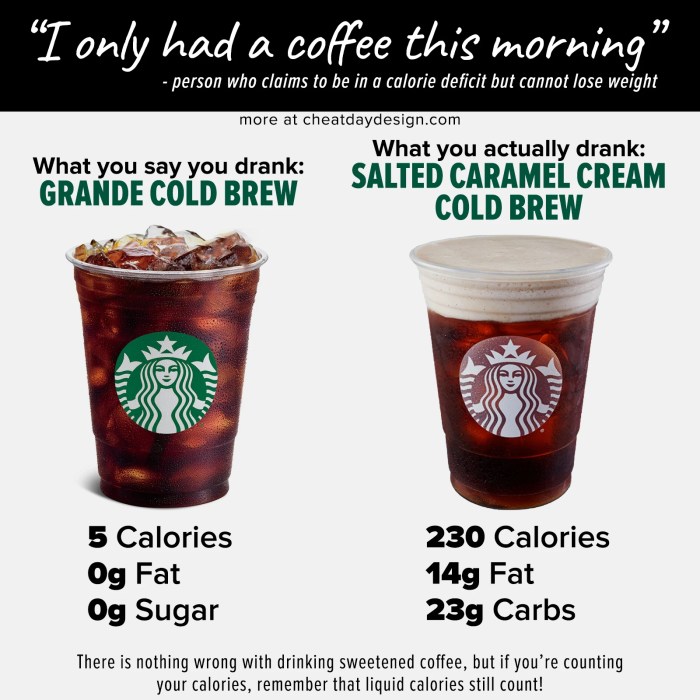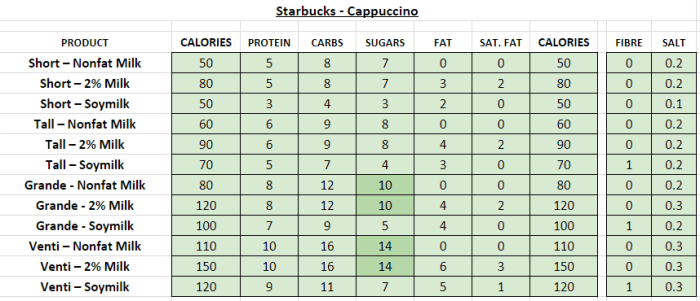Comparison with Competitors

Starbucks new energy drink nutrition facts – Understanding the competitive landscape is crucial for making informed choices about energy drinks. This section compares Starbucks’ new energy drink offering with established players like Red Bull and Monster, examining nutritional profiles, pricing, and overall value. We’ll analyze these factors to help you determine which drink best aligns with your needs and preferences.
Unlocking the nutritional secrets of Starbucks’ new energy drink requires a holistic approach. Understanding the impact of added sugars is crucial, but remember that healthy fats play a vital role too. For a comparison, consider checking out the detailed breakdown of peanut oil nutrition facts , which highlights the importance of balanced fats in a well-rounded diet.
This knowledge helps you make informed choices about your energy drink consumption, ensuring it aligns with your overall wellness goals.
A direct comparison of nutritional content, pricing, and overall value proposition reveals interesting insights into the competitive landscape of energy drinks.
Nutritional Profile Comparison
The nutritional profiles of energy drinks can vary significantly. Analyzing key components like caffeine, sugar, and calories provides a clearer picture of the differences between Starbucks’ offering and its competitors. This allows for a more informed decision based on individual dietary needs and preferences.
- Caffeine Content: Starbucks’ energy drink will likely fall within a similar range to Red Bull and Monster, offering a moderate to high caffeine boost. Precise amounts will vary depending on the specific drink size and flavor. However, all three brands generally aim for a level of caffeine known to provide a noticeable energy lift.
- Sugar Content: This is a key differentiator. While Red Bull and Monster are known for their relatively high sugar content, Starbucks may position its energy drink with a lower sugar option or variations catering to different preferences. This reflects a growing consumer demand for healthier alternatives within the energy drink category.
- Calorie Count: Similar to sugar content, calorie counts will vary. All three brands will likely offer options ranging from moderate to high in calories, depending on the specific formulation and serving size. Consumers should compare labels to find the option that best suits their caloric intake goals.
- Additional Ingredients: Each brand may include additional ingredients like vitamins, herbal extracts, or other functional components that contribute to their unique flavor profiles and purported health benefits. A detailed comparison of ingredient lists is necessary to understand these differences fully.
Pricing Comparison
Pricing is another critical factor influencing consumer choice. The price point of Starbucks’ energy drink, relative to its competitors, will determine its competitiveness in the market. We’ll analyze the price per serving and consider the overall value proposition based on the nutritional content.
Starbucks generally occupies a higher price point than Red Bull and Monster, which are typically positioned as more affordable options. However, the premium pricing for Starbucks may reflect a perceived higher quality or a different target market. A direct price comparison across different serving sizes is needed to determine the value proposition of each brand.
Value Proposition Analysis, Starbucks new energy drink nutrition facts
The overall value proposition considers both the nutritional content and the price. A higher price may be justified if the energy drink offers a superior nutritional profile or unique benefits, such as lower sugar content or added vitamins. Conversely, a lower price may be preferable if the nutritional profile is comparable to more expensive alternatives.
For example, if Starbucks’ energy drink offers a significantly lower sugar content than Red Bull or Monster while maintaining a comparable caffeine level, the higher price may be deemed acceptable by consumers prioritizing health and wellness. Conversely, if the nutritional profiles are similar, the lower price of Red Bull or Monster might offer a more compelling value proposition for price-sensitive consumers.
Health Implications and Considerations

Starbucks’ new energy drink, like many similar beverages, presents a complex relationship with health. While offering a convenient energy boost, its high sugar and caffeine content necessitates careful consideration of potential health impacts, particularly for individuals with pre-existing conditions. Understanding these implications is crucial for responsible consumption.The primary concern revolves around the significant sugar content in these drinks. High sugar intake is strongly linked to weight gain, type 2 diabetes, heart disease, and other metabolic disorders.
The caffeine content, while providing a stimulating effect, can also contribute to anxiety, insomnia, and digestive issues in some individuals if consumed excessively. The combined effect of high sugar and caffeine can be particularly detrimental to overall health.
Sugar Intake and its Health Consequences
Excessive sugar consumption, a common characteristic of many energy drinks, contributes significantly to various health problems. The high fructose corn syrup and added sugars found in many such beverages lead to increased blood sugar levels, potentially leading to insulin resistance and, over time, type 2 diabetes. Furthermore, high sugar diets are associated with increased risk of cardiovascular diseases, non-alcoholic fatty liver disease, and certain types of cancer.
For instance, a daily intake of one or more of these high-sugar energy drinks could easily surpass the recommended daily added sugar intake, leading to long-term health complications. The body’s natural metabolic processes are disrupted, potentially leading to inflammation and chronic diseases.
Caffeine’s Impact on Health
Caffeine, a stimulant found in high concentrations in energy drinks, affects the central nervous system. While offering short-term benefits like increased alertness and focus, excessive caffeine intake can lead to anxiety, nervousness, insomnia, and even heart palpitations. Individuals with pre-existing heart conditions or anxiety disorders should exercise particular caution. For example, consuming several Starbucks energy drinks in quick succession could trigger an adverse reaction, especially for those sensitive to caffeine.
The stimulating effects can also interfere with sleep patterns, leading to fatigue and decreased cognitive function in the long run.
Impact on Individuals with Specific Health Conditions
Individuals with diabetes should be especially cautious about consuming energy drinks due to their high sugar content. The rapid increase in blood glucose levels can be difficult to manage and could lead to hyperglycemia, potentially resulting in serious complications. Similarly, individuals with heart conditions need to be mindful of both the high sugar and caffeine content, as these can exacerbate existing issues and increase the risk of heart-related problems.
For those with anxiety disorders, the caffeine’s stimulating effects can worsen symptoms, leading to increased anxiety and panic attacks. Careful consideration and consultation with a healthcare professional are crucial for these individuals before incorporating energy drinks into their diet.
Recommendations for Responsible Consumption
Responsible consumption involves mindful choices and moderation. Individuals should carefully review the nutrition label, paying close attention to the sugar and caffeine content. Limiting consumption to one serving per day, or even less frequently, is advisable. Staying well-hydrated by consuming water throughout the day can help mitigate some of the negative effects of caffeine and sugar. Choosing alternative sources of energy, such as a balanced diet and sufficient sleep, is crucial for maintaining overall health and well-being.
If you have any pre-existing health conditions, consulting a doctor or registered dietitian before consuming energy drinks is recommended.
Commonly Asked Questions: Starbucks New Energy Drink Nutrition Facts
Are Starbucks energy drinks suitable for diabetics?
Due to the significant sugar content, individuals with diabetes should exercise caution and consult their doctor before consuming Starbucks energy drinks regularly. They may need to adjust their medication or dietary plan accordingly.
How do Starbucks energy drinks compare to coffee in terms of caffeine?
The caffeine content varies across Starbucks energy drink flavors but generally exceeds that of a typical cup of coffee. Always check the specific nutritional information for the exact amount.
Are there artificial sweeteners in Starbucks energy drinks?
This information is not consistently provided across all flavors and requires checking the individual product’s nutrition label. The presence or absence of artificial sweeteners will vary.
What are the long-term effects of consuming Starbucks energy drinks regularly?
Regular high consumption of sugary and caffeinated beverages can contribute to various health issues, including weight gain, increased risk of type 2 diabetes, and sleep disturbances. Moderation is key.
